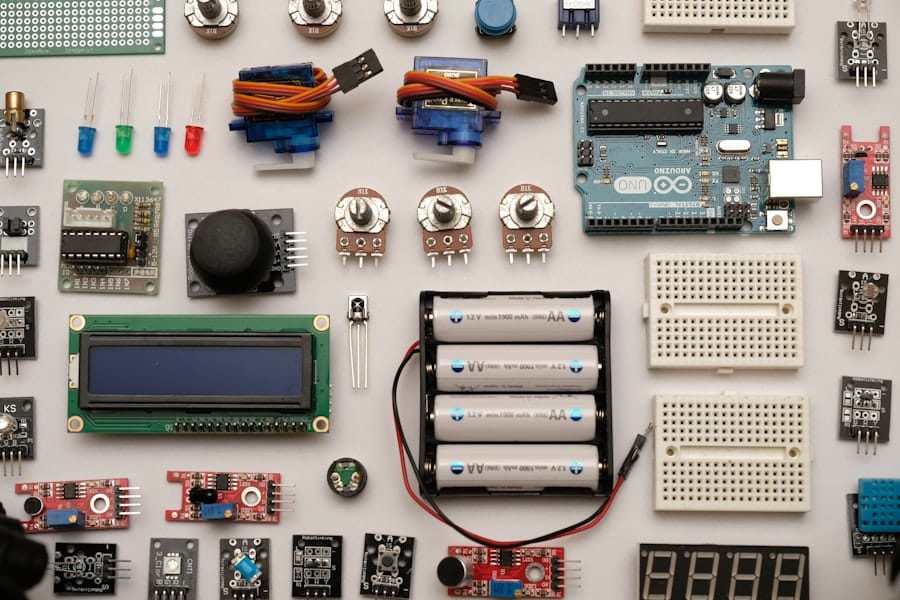Modular electronics represent a transformative approach to the design and manufacturing of electronic devices, characterized by their ability to be easily assembled, disassembled, and upgraded. This paradigm shift in electronics is driven by the need for flexibility, customization, and sustainability in an era where consumer demands are rapidly evolving. Unlike traditional electronics, which often require complete replacement when a single component fails or becomes outdated, modular systems allow users to replace or upgrade individual modules.
This not only extends the lifespan of devices but also reduces electronic waste, a growing concern in our increasingly digital world. The concept of modularity in electronics can be traced back to various fields, including computing and telecommunications. For instance, the rise of modular smartphones, such as Google’s Project Ara, aimed to empower users to personalize their devices according to their needs.
Similarly, modular laptops and tablets have emerged, allowing for easy upgrades of components like RAM, storage, and even processors. This flexibility not only caters to individual preferences but also aligns with broader sustainability goals by minimizing the environmental footprint associated with manufacturing and disposing of electronic devices.
Key Takeaways
- Modular electronics allow for the assembly and disassembly of electronic components, promoting reusability and repairability.
- The environmental impact of modular electronics is reduced due to decreased electronic waste and resource consumption.
- Advantages of modular electronics for sustainable tech include extended product lifespan, reduced e-waste, and easier upgrades and repairs.
- Challenges and limitations of modular electronics include standardization issues, design complexity, and potential for increased energy consumption.
- Innovations in modular electronics for sustainable tech include advancements in modular design, materials, and manufacturing processes.
Environmental Impact of Modular Electronics
The environmental impact of traditional electronics is profound, with millions of tons of e-waste generated annually. According to the Global E-waste Monitor 2020 report, approximately 53.6 million metric tons of e-waste were produced worldwide in 2019, a figure projected to rise significantly in the coming years. This waste often contains hazardous materials that can leach into the environment, posing serious health risks to communities and ecosystems.
In contrast, modular electronics offer a promising solution to mitigate these environmental challenges by promoting repairability and recyclability. By enabling users to replace only the faulty or outdated components rather than discarding entire devices, modular electronics significantly reduce the volume of e-waste generated. For example, if a smartphone’s battery degrades over time—a common issue with traditional devices—users can simply replace the battery module instead of purchasing a new phone.
This not only conserves resources but also diminishes the demand for new raw materials, which are often extracted through environmentally damaging practices. Furthermore, modular designs can facilitate easier recycling processes, as components can be disassembled and sorted more efficiently than in traditional electronics.
Advantages of Modular Electronics for Sustainable Tech

One of the primary advantages of modular electronics lies in their inherent sustainability. The ability to upgrade and repair devices extends their usable life significantly, which is crucial in a world where resource depletion is a pressing concern.
This conservation is particularly important given that many of these materials are finite and their extraction can lead to significant ecological damage. Moreover, modular electronics foster innovation in sustainable technology by encouraging manufacturers to design products with longevity in mind. Companies are increasingly recognizing that consumers value sustainability and are willing to invest in products that align with their environmental values.
For instance, brands like Fairphone have successfully marketed modular smartphones that prioritize ethical sourcing and repairability. This shift not only appeals to environmentally conscious consumers but also sets a precedent for other manufacturers to adopt similar practices, ultimately driving the entire industry toward more sustainable models.
Challenges and Limitations of Modular Electronics
Despite their numerous advantages, modular electronics face several challenges that hinder widespread adoption. One significant limitation is the initial cost associated with developing modular systems. Designing products that are both modular and functional requires substantial investment in research and development.
Manufacturers may be hesitant to allocate resources toward modular designs if they perceive a lack of consumer demand or if they fear that traditional models will continue to dominate the market. Additionally, there are technical challenges related to compatibility and standardization among different modules. For instance, if a manufacturer produces a modular smartphone with unique components, users may find it difficult to source compatible modules from third-party suppliers.
This lack of standardization can lead to confusion and frustration among consumers who wish to upgrade or repair their devices independently. Furthermore, without industry-wide standards for modular components, manufacturers may be reluctant to invest in modular designs due to concerns about market fragmentation.
Innovations in Modular Electronics for Sustainable Tech
Recent innovations in modular electronics have demonstrated the potential for creating sustainable technology solutions that address both consumer needs and environmental concerns. One notable advancement is the development of modular circuit boards that allow for easy integration of various components without soldering or complex assembly processes. These circuit boards can be designed to accommodate different modules, enabling users to customize their devices according to their preferences while simplifying repairs.
Another exciting innovation is the emergence of modular power systems that can be tailored for specific applications. For example, companies are exploring modular battery packs that can be combined or reconfigured based on energy requirements. This flexibility is particularly beneficial for renewable energy applications, where energy storage needs may vary significantly based on usage patterns and environmental conditions.
By allowing users to scale their energy systems according to demand, these modular solutions contribute to more efficient energy consumption and reduced waste.
Applications of Modular Electronics in Sustainable Tech

The applications of modular electronics extend across various sectors, showcasing their versatility and potential for driving sustainable technology initiatives. In the realm of consumer electronics, modular smartphones and laptops have gained traction as alternatives to traditional devices. Companies like Fairphone have pioneered this space by offering smartphones designed for easy repair and upgradeability, appealing to environmentally conscious consumers who prioritize sustainability.
Beyond consumer electronics, modular systems are making significant strides in industries such as renewable energy and smart home technology. For instance, modular solar panels allow homeowners to expand their solar energy systems incrementally based on their energy needs and budget constraints. This adaptability not only makes solar energy more accessible but also encourages wider adoption by reducing upfront costs associated with installing a complete system at once.
In smart home technology, modular devices enable users to customize their home automation systems according to their preferences and requirements. For example, modular smart lighting systems allow homeowners to add or remove light fixtures as needed without requiring extensive rewiring or installation processes.
Future Trends and Developments in Modular Electronics
As the demand for sustainable technology continues to grow, several trends are emerging within the realm of modular electronics that promise to shape the future landscape of this field. One significant trend is the increasing emphasis on circular economy principles in product design. Manufacturers are beginning to adopt strategies that prioritize resource recovery and recycling throughout the product lifecycle.
This shift aligns with global efforts to reduce waste and promote sustainable consumption patterns. Another trend is the integration of advanced technologies such as artificial intelligence (AI) and the Internet of Things (IoT) into modular systems. These technologies can enhance the functionality of modular devices by enabling real-time monitoring and optimization based on user behavior.
For instance, AI algorithms could analyze usage patterns in smart home systems and suggest optimal configurations for energy efficiency or comfort. This level of personalization not only improves user experience but also contributes to overall sustainability by minimizing resource consumption. Furthermore, collaborations between manufacturers, researchers, and policymakers are likely to play a crucial role in advancing modular electronics for sustainable tech.
By working together, stakeholders can establish industry standards for modular components, promote best practices for design and manufacturing, and create incentives for consumers to choose sustainable options. Such collaborative efforts will be essential in overcoming existing challenges and driving widespread adoption of modular solutions across various sectors.
The Role of Modular Electronics in Advancing Sustainable Technology
Modular electronics stand at the forefront of a significant shift toward sustainable technology solutions that address pressing environmental challenges while catering to evolving consumer needs. By promoting repairability, upgradeability, and resource conservation, these systems offer a compelling alternative to traditional electronic devices that contribute heavily to e-waste generation. As innovations continue to emerge within this field, it is clear that modular electronics will play an increasingly vital role in shaping a more sustainable future.
The journey toward widespread adoption of modular electronics will undoubtedly encounter challenges; however, the potential benefits far outweigh these obstacles. With ongoing advancements in design, technology integration, and collaborative efforts among stakeholders, modular electronics are poised to revolutionize how we think about consumer products and their impact on the environment. As we move forward into an era defined by sustainability and innovation, embracing modularity may very well be key to achieving a more responsible approach to technology consumption and production.
In a recent article discussing The Future of Modular Electronics for Sustainable Tech, it is interesting to note the advancements in wearable technology. The article The Best Smartwatch Apps of 2023 highlights the innovative applications that are shaping the future of smartwatches. As modular electronics continue to evolve, the integration of smartwatch technology into sustainable tech solutions could revolutionize the way we interact with our devices. This intersection of wearable technology and sustainability is a promising area for future development.
FAQs
What is modular electronics?
Modular electronics refers to the design and construction of electronic devices using separate modules or components that can be easily connected or disconnected, allowing for customization and flexibility in the assembly of electronic systems.
How does modular electronics contribute to sustainable tech?
Modular electronics contribute to sustainable tech by promoting reusability, repairability, and upgradability of electronic devices. This reduces electronic waste and extends the lifespan of products, ultimately reducing the environmental impact of electronic consumption.
What are the potential benefits of modular electronics for consumers?
Consumers can benefit from modular electronics by having the ability to customize and upgrade their devices according to their specific needs, as well as the option to repair or replace individual components rather than the entire device. This can lead to cost savings and reduced electronic waste.
What are some challenges in the development of modular electronics?
Challenges in the development of modular electronics include ensuring compatibility and standardization of modules across different manufacturers, as well as addressing concerns related to security, reliability, and performance of modular devices.
What are some examples of modular electronic products currently available in the market?
Examples of modular electronic products include modular smartphones, modular laptops, modular smart home devices, and modular electronic kits for educational purposes. These products showcase the potential of modular electronics in various applications.

